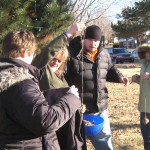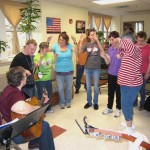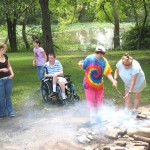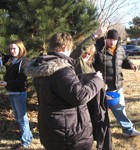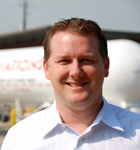When the Kansas State Legislature voted in 1996 to close Winfield State Hospital, the surrounding community was shattered. The hospital served the community’s mentally disabled, and its closure caused great grief and uncertainty among families who did not know where their loved ones would be supported to maintain their quality of life.
Not willing to give up, a group of parents and guardians came together to create an organization that would fill that void. With dedication and passion, Creative Community Living (CCL) was founded later that year and accepted more than 100 clients before the state hospital officially closed in 1998.
CCL serves individuals with developmental disabilities and assists with personal care, life skills, and coordinating community outings and activities to ensure quality of life. “Everybody has the right to be respected and be treated with dignity, and to treat each other in that way,” says Linda Misasi, CCL’s executive director. “We believe our community has embraced that notion from day one.”
The organization’s mission is to help individuals—ranging from the medically fragile to behaviorally challenged—enjoy more choices, independence, productivity, and community inclusion. Located in the three south-central Kansas communities of Winfield, El Dorado, and Arkansas City, CCL runs 23 homes and two day centers. Individuals reside in a variety of homes, ranging from ones with round-the-clock nursing care to one-person apartments with a staff that assists occupants with menu planning, grocery shopping, laundry, housecleaning, and other aspects of their lives.
In addition, CCL offers case management, day services, dental care, and respite services. At the agency’s day centers, individuals can select from a variety of activities that are entertaining but also promote individual independence, including arts and crafts, field trips to parks and zoos, and cooking, writing, or math classes. The day centers also feature relaxation areas, kitchens, workstations, and meeting areas, and are open 24 hours a day, seven days a week.
TOP 3 INITIATIVES
1. Maintain a strong financial base to ensure high-quality services in support of Creative Community Living’s mission
2. Ensure quality and affordable access to dental care for patients
3. Create and maintain partnerships with new professionals in the healthcare industry, including partnering with colleges and universities
Since its founding, CCL has paid attention to the community needs and has evolved to expand its offerings. For instance, after the state hospital closed, families complained of the lack of dental-care accessibility for the developmentally disabled. In 1999, CCL opened its own dental clinic to offer affordable dental care for those in wheelchairs or who needed special attention. The dental clinic’s offerings include cleaning, fillings, extractions, and fluoride treatments from a local dentist, who is aided by CCL nursing staff members. CCL also has behavioral consultants on staff and a quality-assurance department to train and educate its employees to ensure high-quality care—something rare in similar organizations.
With the long list of services that CCL offers, it is a challenge to keep up, but the dedication of the agency’s 280 staff members is what enables success, Misasi says. “We are a group of overachievers,” she explains. “We do our best, and we try to make clear to people what our limitations are. We recognize that we can’t be all things to all people.”
As a small agency, Misasi says it’s important that CCL is a good community member. To meet this standard, the group engages in philanthropic activities, such as partnering with the mental-health center and a hospice for staff training opportunities or buying goods and services from local businesses.
Clients and staff are also encouraged to participate in at least one volunteer opportunity per year—from working with veterans to making decorations for a local nursing home. During its annual casino night fundraiser, CCL raised more than $15,000 to help individuals who can’t afford certain vital supplies and services, such as wheelchairs, dental care, or clothing. “Our staff is very creative in enabling our clients to assist in ways that help the community to the best of the individual’s abilities,” Linda says.
Without CCL’s existence, it would be hard to say where these clients would go, Misasi says. She hopes that the community will never have to know. Instead, CCL will continue to focus on serving its clients in the best way, thanks to the support of the community and CCL’s board, 60 percent of which are family members of individuals with developmental disabilities.
“They keep us grounded in what is important,” Misasi says.
